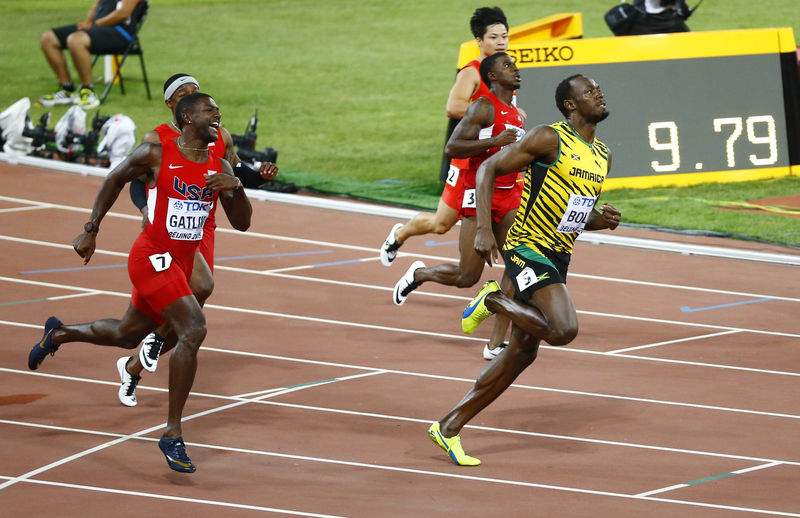By Steven Downes
(Reuters) - "I'm amazed. This is Usain Bolt's best race ever."
That was American athletics great Michael Johnson's view of Bolt's latest 100 metres world championship victory in Beijing on Sunday.
Steve Cram, another past champion and someone who in his role as a commentator for the BBC has witnessed all of the Jamaican sprinter's greatest races, was of a similar opinion when he said that Beijing 2015 was Bolt's "finest day".
Yet Bolt had just won a race in 9.79 seconds, more than two-tenths slower than the world record. So how could this victory be the Jamaican's best?
Bolt has been a global superstar since the day, seven years ago to the week, in the very same Bird's Nest Stadium, when he obliterated the world record, crossing the finishing line in 9.69 seconds to win Olympic gold.
Most astonishing of all was how he had laughed and joked before the start and then spent the final 20 metres of the race with his arms outstretched for the acclaim of the ecstatic crowd, as well as the billions watching at home on television.
Many thought that performance could not be surpassed. Yet a year later, at the world championships in Berlin, Bolt did just that, this time posting 9.58 as his own personal best.
With such highlights to a career, embellished with a further world title in Moscow two years ago and another Olympic gold in London in 2012, it was hard to conceive how Bolt could achieve any more.
But on Sunday, two days after his 29th birthday, the view is that Bolt may have done so, by saving the reputation of his sport.
The back-story to the race in Beijing was of allegations of widespread doping in track and field dominating the headlines in the build up to the championships.
Also in the 100m final was Justin Gatlin, an American who has twice failed drugs tests and yet, at 33, was back on track and running faster than ever.
FINAL SHOWDOWN
Gatlin had come to Beijing with the far better performances this season, right through until the 9.77 run in the semi-final.
Bolt's year, meanwhile, had been blighted by injury, with a pelvic problem to add to the congenital back condition which requires the huge Jamaican to undergo hours of remedial physiotherapy every day.
Short of races, Bolt had admitted that he was not as sharp as he would like to be. In his own semi-final, he stumbled away from his blocks.
Then came the final showdown.
Through most of his senior career, Bolt had rarely been under pressure from his rivals. His chilled antics before race starts, even Olympic finals, had endeared him to his global audience.
There was little of that this time in Beijing, as the tension of the event seemed to affect even him.
Yet it possibly affected Gatlin more. The gun fired and the sprinters were shoulder to shoulder for 60, 70, 80 metres of the race.
Gatlin was gunning it, but he could not shake off Bolt.
Then something visceral happened, something which epitomises top-flight sport. One of the warriors reached down deep within himself, and found that extra bit of effort to ensure that he would not be beaten.
That was how Usain Bolt won the 100m world title for a record-equalling third time.
That was why Bolt had the likes of former track greats such as Johnson so readily singing his praises.
"He'll be most proud of this win without a doubt," Johnson said.

"It's not about technique, it's about running for your life. "He's got the talent to be able to do that."